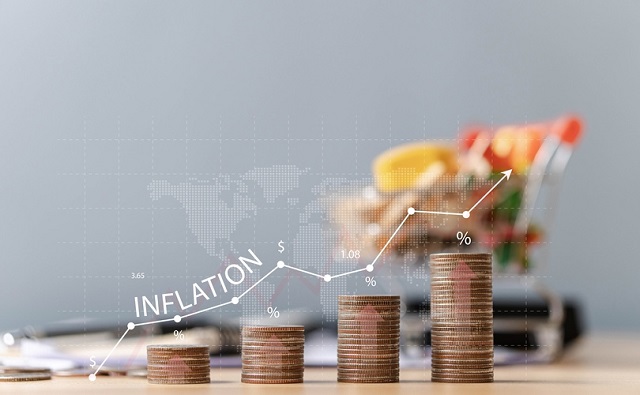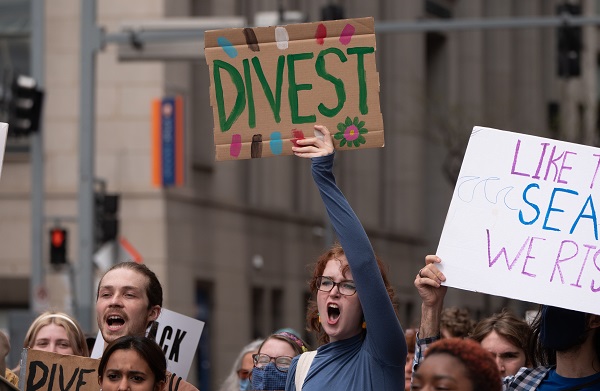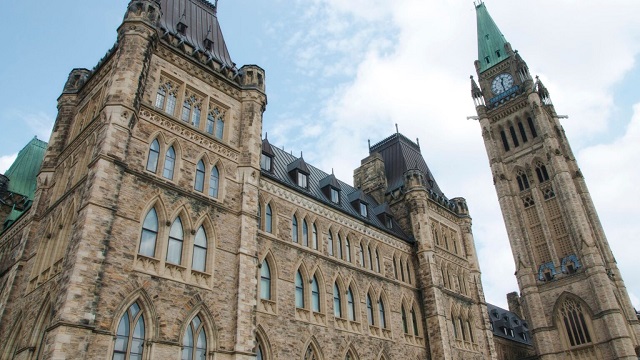Business
Bank of Canada admits eliminating carbon tax could reduce inflation by 16%

From LifeSiteNews
Bank of Canada Governor Tiff Macklem testified that cutting the tax would create a one-time reduction of inflation by 0.6%, which is 16% of Canada’s total inflation rate
Bank of Canada Governor Tiff Macklem admitted that Trudeau’s carbon tax is responsible for 16% of Canada’s current inflation rate.
On October 30, Macklem told the House of Commons finance committee that eliminating the carbon tax would reduce inflation by 0.6%, which is 16% of Canada’s total inflation rate.
“That would create a one-time drop in inflation of 0.6 percentage points,” Macklem told Conservative MP Philip Lawrence, who had questioned the tax’s effect on the economy.
Currently, Canada’s inflation rate is at 3.8% which means that a decrease of 0.6% by eliminating the tax would result in a 16% decrease in the overall inflation.
Lawrence further questioned if eliminating the tax would ease the economic situation, considering it would mean a “sizable drop in inflation.” However, Macklem explained that cutting the tax would only affect inflation for one year.
“It would be helpful if monetary and fiscal policy was rowing in the same direction,” he added, explaining that government spending has made keeping interest rates steady a difficult task.
“Any standard economic textbook will tell you if you cut government spending that will tend to slow growth, raise the unemployment rate, and reduce inflation,” Macklem explained.
In September, Macklem admitted that food costs are of particular concern as “[m]eat’s up six percent, bread’s up 13 percent, coffee’s up eight percent, baby food’s up nine percent. If you look at food overall it is up nine percent.”
Macklem revealed at the time that food prices are rising significantly faster than the headline inflation rate – the overall inflation rate in the country – as staple food items are increasing at a rate of 10 percent to 18 percent year-over-year.
To combat this inflation, the Bank of Canada has raised interest rates to 5 percent, the highest benchmark rate in 22 years. Another increase is expected in October.
In addition to deficit spending, others have pointed to the Trudeau government’s ongoing carbon taxes and energy regulations as one of the reasons for the sharp increases in the cost of living.
According to a March report, Trudeau’s carbon tax is costing Canadians hundreds of dollars annually as government rebates remain insufficient to compensate for the increased fuel prices.
Last week, Prime Minster Justin Trudeau suspended his carbon tax on home heating oil, amid rising costs of living and his decreasing popularity across multiple polls.
Under the new regulations, home heating oil is exempted from the carbon tax, while rural residents will receive a 10 percent increase in the carbon tax rebate payments. The increase is set to climb to 20 percent beginning next year.
In March, the Parliamentary Budget Officer calculated the total carbon tax costs for fuel in 2023 minus government rebates. The steepest increase is for Albertans, who will pay an average of $710 extra per household. Following Alberta is Ontario with a $478 increase.
Prince Edward Island households will pay an extra $465, Nova Scotia $431, Saskatchewan $410, Manitoba $386, and Newfoundland and Labrador $347.
The increased costs are only expected to rise as a recent report revealed that a carbon tax of more than $350 per tonne is needed to reach Trudeau’s net-zero goals by 2050.
Currently, Canadians living in provinces under the federal carbon pricing scheme pay $65 per tonne, but the Trudeau government has a goal of $170 per tonne by 2030.
Business
Honda deal latest episode of corporate welfare in Ontario

From the Fraser Institute
By Jake Fuss and Tegan Hill
If Honda, Volkswagen and Stellantis are unwilling to build their EV battery plants in Ontario without corporate welfare, that sends a strong signal that those projects make little economic sense.
On Thursday, the Trudeau and Ford governments announced they will dole out an estimated $5 billion in corporate welfare to Honda so the auto giant can build an electric vehicle (EV) battery plant and manufacture EVs in Ontario. This is the third such deal in Ontario, following similar corporate welfare handouts to Volkswagen ($13.2 billion) and Stellantis ($15.0 billion). Like the previous two deals, the Honda deal comes at a significant cost to taxpayers and will almost certainly fail to create widespread economic benefits for Ontarians.
The Trudeau and Ford governments finalized the Honda deal after more than a year of negotiations, with both governments promising direct incentives and tax credits. Of course, this isn’t free money. Taxpayers in Ontario and the rest of Canada will pay for this corporate welfare through their taxes.
Unfortunately, corporate welfare is nothing new. Governments in Canada have a long history of picking their favoured firms or industries and using a wide range of subsidies and other incentives to benefit those firms or industries selected for preferential treatment.
According to a recent study, the federal government spent $84.6 billion (adjusted for inflation) on business subsidies from 2007 to 2019 (the last pre-COVID year). Over the same period, provincial and local governments spent another $302.9 billion on business subsidies for their favoured firms and industries. (Notably, the study excludes other forms of government support such as loan guarantees, direct investments and regulatory privileges, so the total cost of corporate welfare during this period is actually much higher.)
Of course, when announcing the Honda deal, the Trudeau and Ford governments attempted to sell this latest example of corporate welfare as a way to create jobs. In reality, however, there’s little to no empirical evidence that corporate welfare creates jobs (on net) or produces widespread economic benefits.
Instead, these governments are simply picking winners and losers, shifting jobs and investment away from other firms and industries and circumventing the preferences of consumers and investors. If Honda, Volkswagen and Stellantis are unwilling to build their EV battery plants in Ontario without corporate welfare, that sends a strong signal that those projects make little economic sense.
Unfortunately, the Trudeau and Ford governments believe they know better than investors and entrepreneurs, so they’re using taxpayer money to allocate scarce resources—including labour—to their favoured projects and industries. Again, corporate welfare actually hinders economic growth, which Ontario and Canada desperately need, and often fails to produce jobs that would not otherwise have been created, while also requiring financial support from taxpayers.
It’s only a matter of time before other automakers ask for similar handouts from Ontario and the federal government. Indeed, after Volkswagen secured billions in federal subsidies, Stellantis stopped construction of an EV battery plant in Windsor until it received similar subsidies from the Trudeau government. Call it copycat corporate welfare.
Government handouts to corporations do not pave the path to economic success in Canada. To help foster widespread prosperity, governments should help create an environment where all businesses can succeed, rather than picking winners and losers on the backs of taxpayers.
Authors:
Business
Maxime Bernier warns Canadians of Trudeau’s plan to implement WEF global tax regime

From LifeSiteNews
If ‘the idea of a global corporate tax becomes normalized, we may eventually see other agreements to impose other taxes, on carbon, airfare, or who knows what.’
People’s Party of Canada leader Maxime Bernier has warned that the Liberal government’s push for World Economic Forum (WEF) “Global Tax” scheme should concern Canadians.
According to Canada’s 2024 Budget, Prime Minister Justin Trudeau is working to pass the WEF’s Global Minimum Tax Act which will mandate that multinational companies pay a minimum tax rate of 15 percent.
“Canadians should be very concerned, for several reasons,” People’s Party leader Maxime Bernier told LifeSiteNews, in response to the proposal.
“First, the WEF is a globalist institution that actively campaigns for the establishment of a world government and for the adoption of socialist, authoritarian, and reactionary anti-growth policies across the world,” he explained. “Any proposal they make is very likely not in the interest of Canadians.”
“Second, this minimum tax on multinationals is a way to insidiously build support for a global harmonized tax regime that will lower tax competition between countries, and therefore ensure that taxes can stay higher everywhere,” he continued.
“Canada reaffirms its commitment to Pillar One and will continue to work diligently to finalize a multilateral treaty and bring the new system into effect as soon as a critical mass of countries is willing,” the budget stated.
“However, in view of consecutive delays internationally in implementing the multilateral treaty, Canada cannot continue to wait before taking action,” it continued.
The Trudeau government also announced it would be implementing “Pillar Two,” which aims to establish a global minimum corporate tax rate.
“Pillar Two of the plan is a global minimum tax regime to ensure that large multinational corporations are subject to a minimum effective tax rate of 15 per cent on their profits wherever they do business,” the Liberals explained.
“The federal government is moving ahead with legislation to implement the regime in Canada, following consultations last summer on draft legislative proposals for the new Global Minimum Tax Act,” it continued.
According to the budget, Trudeau promised to introduce the new legislation in Parliament soon.
The global tax was first proposed by Secretary-General of Amnesty International at the WEF meeting in Davos this January.
“Let’s start taxing carbon…[but] not just carbon tax,” the head of Amnesty International, Agnes Callamard, said during a panel discussion.
According to the WEF, the tax, proposed by the Organization for Economic Co-operation and Development (OECD), “imposes a minimum effective rate of 15% on corporate profits.”
Following the meeting, 140 countries, including Canada, pledged to impose the tax.
While a tax on large corporations does not necessarily sound unethical, implementing a global tax appears to be just the first step in the WEF’s globalization plan by undermining the sovereignty of nations.
While Bernier explained that multinationals should pay taxes, he argued it is the role of each country to determine what those taxes are.
“The logic of pressuring countries with low taxes to raise them is that it lessens fiscal competition and makes it then less costly and easier for countries with higher taxes to keep them high,” he said.
Bernier pointed out that competition is good since it “forces everyone to get better and more efficient.”
“In the end, we all end up paying for taxes, even those paid by multinationals, as it causes them to raise prices and transfer the cost of taxes to consumers,” he warned.
Bernier further explained that the new tax could be a first step “toward the implementation of global taxes by the United Nations or some of its agencies, with the cooperation of globalist governments like Trudeau’s willing to cede our sovereignty to these international organizations.”
“Just like ‘temporary taxes’ (like the income tax adopted during WWI) tend to become permanent, ‘minimum taxes’ tend to be raised,” he warned. “And if the idea of a global corporate tax becomes normalized, we may eventually see other agreements to impose other taxes, on carbon, airfare, or who knows what.”
Trudeau’s involvement in the WEF’s plan should not be surprising considering his current environmental goals – which are in lockstep with the United Nations’ 2030 Agenda for Sustainable Development – which include the phasing out coal-fired power plants, reducing fertilizer usage, and curbing natural gas use over the coming decades.
The reduction and eventual elimination of so-called “fossil fuels” and a transition to unreliable “green” energy has also been pushed by the World Economic Forum – the aforementioned group famous for its socialist “Great Reset” agenda – in which Trudeau and some of his cabinet are involved.
-

 COVID-1912 hours ago
COVID-1912 hours agoJapanese study finds ‘significant increases’ in cancer deaths after third mRNA COVID doses
-

 Business10 hours ago
Business10 hours agoMaxime Bernier warns Canadians of Trudeau’s plan to implement WEF global tax regime
-

 Brownstone Institute8 hours ago
Brownstone Institute8 hours agoA Coup Without Firing a Shot
-

 COVID-196 hours ago
COVID-196 hours agoWHO Official Admits the Truth About Passports
-

 Energy4 hours ago
Energy4 hours agoAnti-LNG activists have decided that they now actually care for LNG investors after years of calling to divest
-

 Bruce Dowbiggin9 hours ago
Bruce Dowbiggin9 hours agoCoyotes Ugly: The Sad Obsession Of Gary Bettman
-

 Freedom Convoy7 hours ago
Freedom Convoy7 hours agoOttawa spent “excessive” $2.2 million fighting Emergencies Act challenge
-

 Frontier Centre for Public Policy11 hours ago
Frontier Centre for Public Policy11 hours agoThe tale of two teachers




